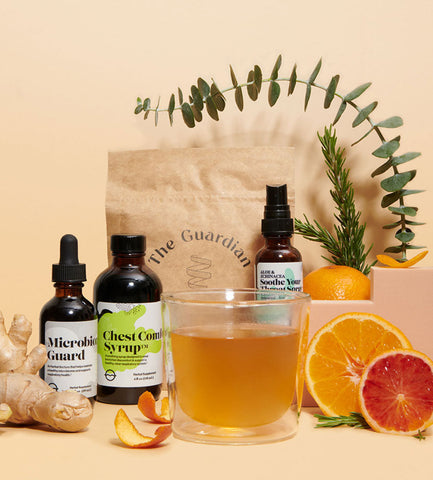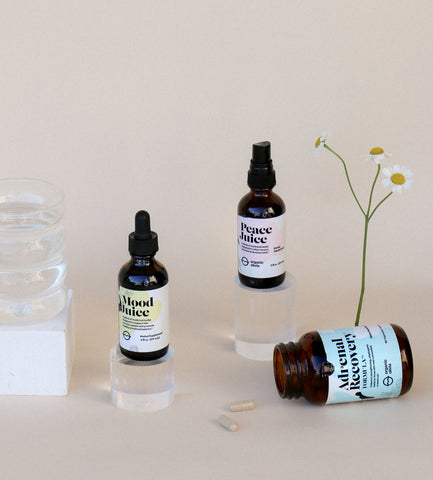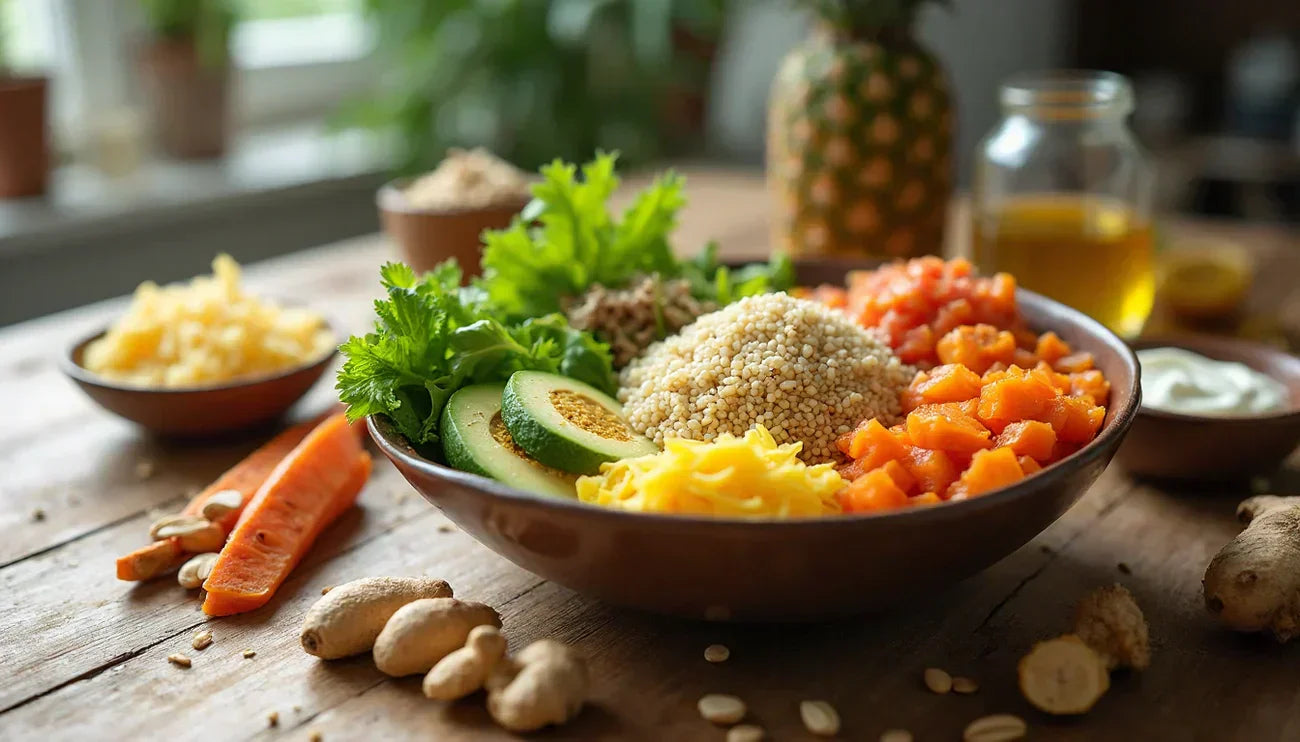If your stomach feels like it's throwing a tantrum after every meal, you're not imagining it — your digestion really is trying to tell you something. Indigestion can be a frustrating and uncomfortable experience, but there are numerous natural indigestion treatments and remedies that can provide quick relief. In this article, we'll explore how to cure indigestion fast and effectively using natural methods.
That sluggish, bloated, overfull feeling? The burning sensation that creeps up your chest or the nausea that lingers long after you eat? These aren't random annoyances — they're SIGNALS. And more often than not, the root cause is surprisingly simple: what you're eating, how you're eating, and the state of your nervous system while doing it.
Indigestion doesn't mean your body is broken. It means it needs support, not just from quick-fix antacids, but from daily habits and herbal allies that get to the root of the issue. Research shows that natural remedies like ginger can reduce symptoms by up to 73%, and combinations like peppermint and caraway oil have helped hundreds of people feel real relief.
You don't need to suffer through another meal that leaves you clutching your stomach in regret. I'm going to walk you through all the natural remedies for indigestion that actually work – no fake promises, just real relief.
Common Signs of Indigestion You Shouldn't Ignore
Your body is constantly talking to you, and when it comes to digestive troubles, those signals shouldn't be brushed aside. Learning to read these digestive distress warnings early gives you the power to take action before that uncomfortable feeling turns into full-blown misery.
Bloating and stomach discomfort
That tight, overly full sensation in your upper belly is usually the first red flag that your digestive system is struggling. After eating, your stomach might actually look visibly swollen or distended – this isn't just in your head! This happens when your body produces excess gas or when the food you've eaten isn't moving through your system at the right pace.
The discomfort can range from a mild "I feel stuffed" sensation to sharp, stabbing stomach pain that has you doubled over. You'll probably notice this feeling gets WAY worse after eating greasy foods, drinking anything bubbly, or scarfing down your meal in record time. If you ignore it, this bloating can stick around for hours, making even basic things like walking or sitting at your desk feel uncomfortable.
Nausea and acid taste
That gross, sour taste creeping up into your mouth is another clear sign your digestion is off. This happens when the acids that should stay in your stomach decide to take a trip north into your esophagus, creating that unmistakable burning feeling most of us know all too well. Along with this acid party in your throat, you might feel waves of nausea washing over you, especially after eating.
When these two symptoms team up, they can make the thought of eating feel like punishment rather than pleasure. If this happens often enough, you might start skipping meals altogether, which creates its own set of nutritional problems. Digestive Juice can help balance those excess stomach acids naturally, tackling both the nausea and that awful acid taste at the same time.
Burping and gas after meals
If you find yourself constantly belching or passing gas after meals, your digestive system is basically sending up signal flares that it's struggling to break down your food properly. While an occasional burp is totally normal, constant or painful gas is your body telling you something isn't right.
This typically happens when food doesn't get fully broken down, allowing the bacteria hanging out in your digestive tract to have a feast on those undigested particles. The result? Fermentation creates gas that has to escape somehow. You might notice certain foods are major culprits – beans, dairy products, or those super-healthy high-fiber veggies can trigger more intense gas episodes for many people.
True indigestion isn't just a one-time thing after eating too much birthday cake – the symptoms stick around and keep coming back. By paying attention to these warning signs, you can address what's actually causing the problem instead of just temporarily masking the discomfort with quick fixes that don't solve anything.
8 Natural Remedies to Stop Indigestion Fast
When that uncomfortable fullness hits after a meal, nature offers some pretty incredible solutions that work FAST to bring relief. I've explored tons of indigestion natural remedies over the years, and these eight stand out as the most effective for tackling it at its source – not just masking symptoms. These home remedies for indigestion can help you find quick relief and improve your overall digestive health.
1. Ginger tea or chews for quick relief
Ginger is seriously one of my favorite digestive allies. This warming root speeds up how quickly your stomach empties and calms inflammation throughout your digestive tract. Research is pretty impressive here – studies show ginger supplements can improve indigestion symptoms by anywhere from 35% to 73%.
For a simple remedy, slice fresh ginger root and steep it in hot water for 10-15 minutes. Or keep some natural ginger chews in your bag for on-the-go relief. Just don't go overboard – experts suggest staying under 4 grams daily to avoid the irony of getting heartburn from your heartburn remedy.
2. Peppermint tea or oil capsules
Peppermint is amazing for relaxing those tight digestive muscles and getting your bile flowing properly, which helps food move through your system faster. When researchers looked at 57 people with IBS, a whopping 75% found significant relief after taking enteric-coated peppermint capsules.
But here's an important note – if you're dealing with GERD (gastroesophageal reflux disease), you might want to skip this one. Peppermint tea can actually relax the muscle between your stomach and esophagus too much, potentially making acid reflux worse. Know your body!
3. Chamomile tea to calm the stomach
If your stomach feels like it's in knots, chamomile tea might be your new best friend. With its gentle sedative properties, chamomile soothes irritated stomach muscles and reduces gas, bloating, and overall digestive discomfort. It's as simple as steeping a tea bag or some dried chamomile flowers in hot water for about 5 minutes.
People have been turning to chamomile as a homemade remedy for indigestion for literally centuries – it's one of those time-tested remedies that has earned its reputation for easing everything from excessive gas to general indigestion.
4. Apple cider vinegar in warm water
The research here is a bit mixed, but I've seen so many people find relief by mixing 1-2 teaspoons of raw apple cider vinegar in a glass of warm water before meals. It seems counterintuitive that something acidic would help, but for many people with indigestion, the issue is actually too little stomach acid rather than too much.
If you try this remedy, always dilute it properly and consider drinking through a straw to protect your tooth enamel. Your dentist will thank you!
5. Fennel seeds or fennel tea
Fennel seeds contain these amazing oils with both anti-inflammatory and antibacterial properties that work wonders for reducing gas and bloating. Beyond just symptom relief, studies suggest fennel might actually help strengthen your stomach lining and protect against inflammatory bowel conditions.
For quick relief, try chewing about a teaspoon of seeds after meals (this is super common in Indian restaurants for a reason!), or steep them in hot water for 5-10 minutes for a soothing tea. The subtle licorice flavor is actually quite pleasant once you get used to it.
6. Baking soda and water solution
For those moments when you need relief RIGHT NOW, baking soda (sodium bicarbonate) neutralizes excess stomach acid almost immediately. Mix half a teaspoon in 4 ounces of water and sip it slowly – don't gulp it down. This is one of the foods that neutralize stomach acid immediately and can provide quick relief from indigestion.
But don't overdo this remedy. Adults should stick to a maximum of seven half-teaspoon doses in 24 hours, and if you're over 60, limit it to just three doses. Also important – wait at least 2 hours between doses. This isn't something you want to rely on daily, but for occasional relief, it works like magic.
7. Lemon water before meals
This one might seem totally counterintuitive – how could acidic lemon juice possibly help indigestion? But here's the fascinating thing – once lemon water is metabolized in your body, it actually has an alkalizing effect.
A study from 2021 found that drinking about 300ml of lemon water before meals helped promote digestion and improved intestinal contractions. Try mixing a tablespoon of fresh lemon juice in 8 ounces of water and drinking it about 20 minutes before eating. Your digestive system will be primed and ready for that meal!
8. Licorice root extract or tea
I'm not talking about those red candy twists – real licorice root, especially in its deglycyrrhizinated form (DGL), helps increase protective mucus activity in your digestive tract, shielding your esophagus from acid damage.
The research here is pretty convincing – one study with 50 adults suffering from indigestion found significant improvement in their symptoms after taking 75mg licorice extract capsules twice daily for 30 days. You can find licorice tea ready-made or make your own from dried roots or leaves for a soothing digestive tonic.
How to Use Digestive Juice for Natural Indigestion Relief
If you're dealing with regular indigestion, one of the most overlooked solutions is supporting your body's digestive enzyme production — and that's where Digestive Juice, my go-to herbal formula, comes in. It's designed to support healthy digestion at. a fundamental level, which is the biggest factor in whether your food digests smoothly or turns into bloating, gas, or that awful too-full feeling.
Unlike synthetic antacids that just mask the discomfort, Digestive Juice works by stimulating your body's natural digestive secretions — like hydrochloric acid and bile — so food gets broken down efficiently right from the start. When you break down your food well, you're less likely to experience fermentation, reflux, or lingering nausea.
When and how to take it for best results
Take Digestive Juice about 10–15 minutes before your meals, especially those with protein or heavier fats. This timing helps prep your stomach for the digestive work ahead. You can also take it after a meal if you've already started feeling that heavy, slow, "food just sitting there" sensation — it helps jumpstart things and gets things moving.

Digestive Juice
A fast-acting blend of digestive bitters used before or after meals to support digestion, occasional gas and bloating.*
STAR HERB: Gentian
If you notice that bloating, acid, or fullness are common for you, try pairing Digestive Juice with a few deep breaths or a calming herbal tea like chamomile. That simple combo of nervous system support and digestive stimulation can be a game-changer for mealtime comfort.
Why it's safer than synthetic antacids
Here's the real problem with synthetic antacids - they just neutralize stomach acid temporarily without addressing what's actually causing your discomfort. Natural digestive juices tackle the root cause by supporting proper food breakdown. Even simple foods like milk and broccoli have shown antacid activity similar to commercial products, but with the bonus of actual nutritional benefits.
What's even better is how natural digestive juices maintain that delicate pH balance your body needs. Your stomach already has this brilliant system where it produces protective mucus containing bicarbonate that neutralizes acid before it can damage your stomach walls. Natural remedies work in harmony with this system rather than disrupting it. This is why you don't get that annoying "rebound acid production" that happens so often with synthetic antacids, where you feel better briefly then worse later.
When to See a Doctor for Indigestion
I'm all about natural solutions for digestive woes, but let's have a real heart-to-heart about when those remedies aren't enough. While ginger tea and peppermint might work wonders for occasional discomfort, there are definite red flags that signal it's time to get professional help.
Persistent symptoms beyond two weeks
Your body is pretty amazing at healing itself, and mild indigestion usually clears up within a few days. But if you've been suffering for more than two weeks despite trying all the natural remedies we've talked about? That's your body telling you something deeper might be going on.
If you find yourself reaching for that bottle of antacids daily or noticing that even Digestive Juice isn't giving you lasting relief anymore, it's definitely time to schedule an appointment with your healthcare provider. Persistent indigestion isn't something to brush off – it could be signaling conditions like gastritis, peptic ulcers, or even gallbladder issues that need proper medical attention.
Warning signs like black stools or vomiting
Some symptoms alongside indigestion are non-negotiable when it comes to seeking help. If you notice ANY of these, call your doctor right away:
-
Dropping weight without trying or suddenly losing your appetite
-
Throwing up repeatedly or (especially concerning) vomiting with blood
-
Black, tarry stools that look like coffee grounds (this is digested blood – NOT normal)
-
Growing difficulty swallowing
-
Feeling constantly exhausted or weak
-
Yellowing of your eyes or skin
These aren't just uncomfortable inconveniences – they're serious warning signs that something much bigger than simple indigestion is happening in your body. Your doctor will probably want to run some tests like bloodwork, breath or stool samples, or maybe even an endoscopy to figure out what's really going on.
Indigestion with chest pain or shortness of breath
This one is SUPER important: if your "indigestion" comes with any of these symptoms, don't wait for a doctor's appointment – go to the emergency room or call 911 immediately:
-
Chest pain (especially if it travels to your jaw, neck, or arm)
-
Trouble catching your breath
-
Sudden sweating or feeling dizzy for no reason
-
Tightness or pressure in your chest that feels like someone's sitting on you
Many people mistake heart attacks for bad heartburn, especially women. Women often experience heart attacks differently than men – instead of dramatic chest clutching, women might just feel nauseated or have what seems like indigestion. If you're not 100% sure whether you're dealing with heartburn or something more serious, always err on the side of caution. Your life is worth more than worrying about an "unnecessary" trip to the ER.
Conclusion
Indigestion might feel like it's completely ruining your day, but as we've seen, nature gives us SO many powerful tools for quick relief. I think one of the most important things to remember is the difference between that occasional discomfort we all get after a big meal and those warning signs that mean you should call your doctor. When you address the root causes of indigestion with natural remedies instead of just masking symptoms, you're giving your body long-term support that goes way beyond temporary fixes.
Ginger, peppermint, chamomile, and fennel aren't just old wives' tales – they're scientifically-backed powerhouses that actually work WITH your body's natural processes rather than against them. That's why I love Digestive Juice so much – its enzyme-rich formula supports proper food breakdown right at the source, which means less bloating, less gas, and no more of that horrible too-full feeling after meals.
Your daily habits play a HUGE role in preventing future digestive meltdowns. Simple dietary changes and lifestyle modifications can make all the difference – eating smaller meals throughout the day, really taking the time to chew your food thoroughly (something most of us rush through), figuring out which foods trigger your symptoms and limiting them, and staying hydrated. I've also found that taking a few deep breaths before eating or doing some gentle stretches helps prepare my digestive system to do its job properly.
Remember, everyone deals with indigestion sometimes – it's just part of being human. But you definitely don't need to suffer through it or rely on those synthetic medications with their long list of potential side effects. Natural remedies give you quick, effective relief while supporting your overall gut health. The next time your stomach starts to protest after a meal, reach for these natural solutions first – your entire digestive system will thank you.
















